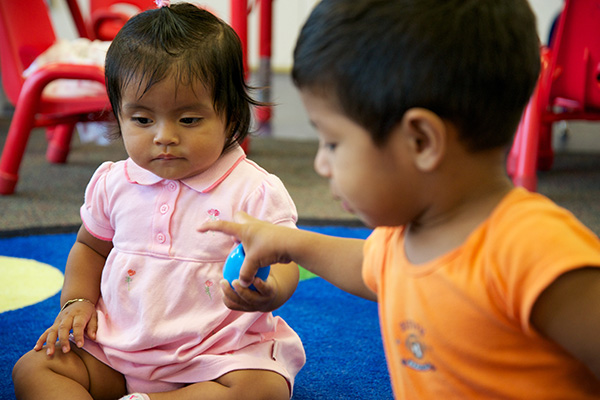Emotional and Behavioral Self-Regulation: Video 1
Emotional and Behavioral Self-Regulation: Video 1
 Social and Emotional Development is one of the five central domains of the Head Start Early Learning Outcomes Framework (ELOF). It focuses on children's ability to create and sustain meaningful relationships with adults and other children. These resources explore the ways children learn to express, recognize, and manage their own emotions, as well as respond appropriately to others' emotions.
Social and Emotional Development is one of the five central domains of the Head Start Early Learning Outcomes Framework (ELOF). It focuses on children's ability to create and sustain meaningful relationships with adults and other children. These resources explore the ways children learn to express, recognize, and manage their own emotions, as well as respond appropriately to others' emotions.
Other ELOF domains include Approaches to Learning; Language and Literacy; Cognition; and Perceptual, Motor, and Physical Development.
Emotional and Behavioral Self-Regulation: Video 1
The webisodes in this series offer key messages and helpful resources to get staff started with the youngest children and their families. Managers can use Early Essentials to design orientation experiences or staff can participate on their own.
Explore the Early Essentials video series. Learn what Early Head Start, Migrant and Seasonal Head Start, and child care staff can do to support infant and toddler development and learning.
Learn teaching practices to help children develop a varied emotional vocabulary and identify feelings in themselves and others. Practice talking with families about children's emotional literacy.
The ideas and strategies outlined below are available in a variety of formats. They include Twitter postings ("tweets"), classroom activities, and supplemental materials that can be sent home for families to do at home.
The What Works Brief is a continuing series of easy-to-read, "how to" information packets on a variety early learning practices. Program managers and in-service providers may find this resource useful in meeting professional development needs. This brief discusses children’s emotional literacy and illustrates practical intervention strategies for early childhood settings and home environments
This in-service suite offers ideas teachers can use to engage children in classroom activities and routines. Learn how giving simple tasks to children keeps them involved.
Daily separations and reunions are part of the fabric of relationships. In center-based and family child care programs, they provide opportunities to develop a young child's skill at making positive transitions.
Share these posters with families to help them identify daily routines and learn how to increase positive social and emotional support throughout the day.
All young children benefit when their caregivers are healthy and not too stressed or depressed. Explore practical tools to help caregivers build positive relationships with their infants, toddlers, and preschoolers and reduce stress.